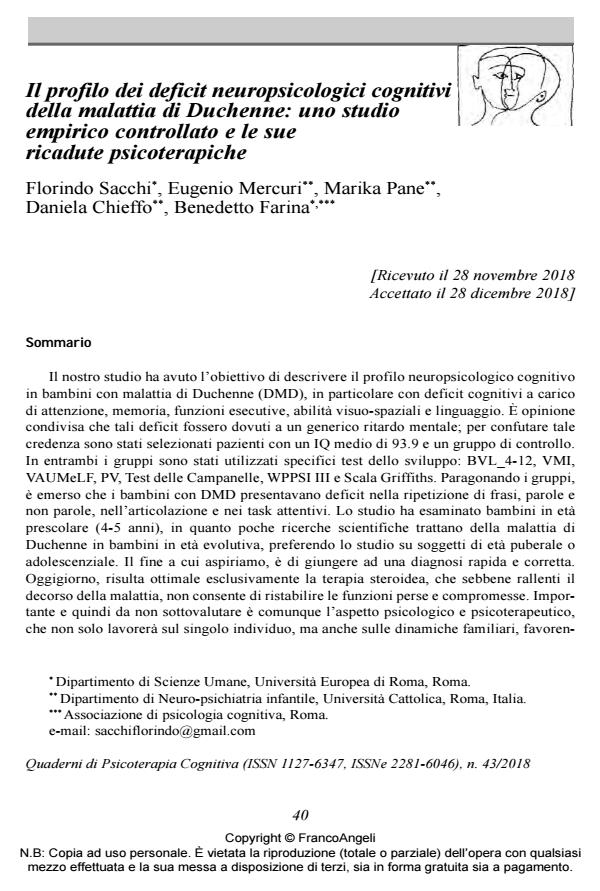The profile of cognitive neuropsychological deficits of Duchenne Muscular Dystrophy: a controlled empirical study and its psychotherapeutic implications
Journal title QUADERNI DI PSICOTERAPIA COGNITIVA
Author/s Florindo Sacchi, Eugenio Mercuri, Marika Pane, Daniela Chieffo, Benedetto Farina
Publishing Year 2019 Issue 2018/43
Language Italian Pages 16 P. 40-55 File size 60 KB
DOI 10.3280/QPC2018-043003
DOI is like a bar code for intellectual property: to have more infomation
click here
Below, you can see the article first page
If you want to buy this article in PDF format, you can do it, following the instructions to buy download credits

FrancoAngeli is member of Publishers International Linking Association, Inc (PILA), a not-for-profit association which run the CrossRef service enabling links to and from online scholarly content.
Our study aimed to describe the cognitive neuropsychological profile in children with Duchenne Muscular Dystrophy (DMD), particularly those with cognitive deficits in charge of attention, memory, executive functions, visuospatial abilities, and language. It’s shared opinion that these deficiencies were due to generic mental retardation; to refute this belief, patients with an average IQ of 93.9 and a control group were selected. In both groups, specific development tests were used: BVL_4-12, VMI, VAUMeLF, PV, the Bells Test, WPPSI III, and the Griffiths Scales. Comparing the groups, it was found that children with DMD had deficits in the repetition of sentences, words and not words, in articulation and attentional tasks. The study examined preschool children (4-5 years), as few scientific studies deal with Duchenne Muscular Dystrophy in children in developmental age, preferring the study of pubertal or adolescent subjects. The goal to which we aspire is to arrive at a quick and correct diagnosis. Nowadays, only steroid therapy is optimal, and although it slows down the course of the illness, it does not allow to restore the lost and compromised functions. The psychological and psychotherapeutic aspect is important and therefore not to be underestimated, it will work not only on the individual, but also on family dynamics, thus favoring the serene acceptance of the illness and its consequences, and therefore assisting with health treatment.
Keywords: Duchenne Muscular Dystrophy, preschool age, cognitive deficit, combined treatment, early diagnosis.
Florindo Sacchi, Eugenio Mercuri, Marika Pane, Daniela Chieffo, Benedetto Farina, Il profilo dei deficit neuropsicologici cognitivi della malattia di Duchenne: uno studio empirico controllato e le sue ricadute psicoter apiche in "QUADERNI DI PSICOTERAPIA COGNITIVA" 43/2018, pp 40-55, DOI: 10.3280/QPC2018-043003